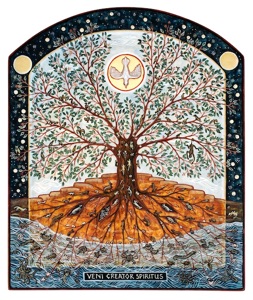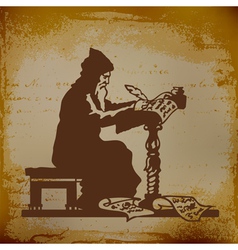Spiritual discernment combined with spiritual authority are powerful attributes in expressing the spoken word, prayer, or sowing good seeds. Discernment can lead to a precise refinement in spiritual development. Spiritual authority gives your discernment power.

Tree of Life
Dove represents ‘God encompassing’.
Sea creatures and land animals are below.
In Gen. 1.26-30, Adam is given authority over that which God had already created. In Gn. 1.26, the word “rule” is used relative to “…over all the earth.”
In Gn. 2.5, “…and there was not a man to till the ground,” indicates an intent by God and a purpose for man. The earth was not created of and for itself only, but that man is integral to the creation. He will till the soil, he will keep himself up, he will have experiences, he will experience the earth. As God is constructive, these experiences are for man’s soul development, which includes the labor he will assume.
Just as Adam perceives himself as alive and whole, which correlates with the Tree of Life, the Tree of Good and Bad presents an option, but perhaps an option not well understood. Verse 17 indicates that choice will require discernment or wisdom as to what is good (Tree of Life) and that bad should be left untouched (“surely die”). The later argument from the Satan-Serpent leans toward rebellion and is described in the Temptation (Adam and Eve). Disobedience associates rebellion, with obedience representing what is good.
The strict standard of obedience does not sit well with ‘freedom-loving Americans’, but the one issue overlooked is responsibility within freedom. Responsibility yields obedience, ingrained within all actions and is a standard all the world recognizes. Responsibility is a spiritual standard and also encompasses conduct. What Adam had in the Garden was good, but through the adventure into Good and Evil, Adam divests himself of the basic responsibility toward wisdom. Without wisdom, he cannot obey. Without obedience great calamities may usher into life’s circumstances, leading to a denigration of the soul, loss of awareness, and the proverbial grind of learning by trial and error, but without the spiritual perception assist in such decisions.
Experience sharpens lessons in discernment, of that there is no doubt. In Gen. 2.19-20, Adam gains his first steps into a new experience—Adam is given experiences by being given the authority to name. God then forms all the animals and brings them to Adam, “…brought them unto Adam to see what he would call them.” God wanted to see how Adam would name the animals. The groundwork for how we discern and how we name is laid. Scripture thus associates Adam with the attribute of discernment and the authority to name forming a proper pathway toward soul development.
In the moral equation, God has denied nothing to Adam.
Adam blames “the woman you gave me,”
for having eaten the fruit from the Tree of the
Knowledge of Good and Evil. Interestingly,
Eve is later given her actual name (Gn. 3.20).
Adam abdicates his responsibility.
It is he who is told about the Tree of Good and
Evil (Bad) (Gn. 2.17). “The Woman” arrives in Gn. 2.19.
Every day we make discernments, and we name the world around us. Naming to the good, we partake, and to the evil, we do not. As to the garden, discernment (wisdom) of good and evil takes on new importance. Not understanding, Adam and Eve become responsible for how they name what is before them. Much like Adam and Eve, our discernment, speaking and naming, and our final choices deliver the consequences of our daily lives.
*
THE WORD: ORDER TO EVENTS
Without the power to name, God, nor we, would possess spiritual power. Nothing could be clearly defined. Just as God created by His word, what you release from your mouth defines you and begins to shape your created life. Like the Creation itself, life flows from inward out. It does not matter how high or low your spiritual condition may be—events in your life will appear because of how you speak and name, much as they did for Adam and Eve. By how you speak, thence the order of your life and the order of events becomes set in motion.
Adam has the spirit and light of God imbued within him, or ‘blown into him’. Through Adam’s spiritual inheritance, all men and women receive the power to name. The spirit gives life to the soul, and man’s spoken word is animated from the spirit within, thus the spirit gives meaning and power to Adam’s spoken word. The power of Adam’s naming was complete.
Just as with Adam and Eve in the garden, just as with Jesus, the more awakened a soul, the more powerful his naming becomes! The previous sentence partially explains why the fall from a higher condition can be swift and devastating, just as Adam and Eve discover.
God delivers His first great gift as he bequeaths Adam with the power to discern and differentiate, essentially the power to name. Many spiritual gifts are mentioned in the Hebrew Bible and the New Testament. The Power of the Spoken Word cannot be emphasized enough for those who Walk in the Way. It is the one gift all people possess!
*
We also demonstrate our individuality as the power to name goes before us. If we speak or name toward the good, then the basis for good becomes ordered; if we name to the bad, then a like order is established. Both Adam and Eve demonstrate this lesson within the Garden. If we name to the good on one occasion and name to the bad upon the next, to love and then to curse–the veritable mixed fruit–then a mixed order will follow. Only confusion can result from such speaking.

Be clear and consistent (speak from the spirit) when you speak the Word.
The Word should be spoken to rectify a person’s pathway or soul nature, for it can completely change the speaker’s life. Remember, speaking from the spirit, speaking the Word, resides as an act of creation, much as when first spoken (thought-expression) by God, “Let there be light.” With attentiveness (discernment), a person’s whole life may be recreated by the spoken word.
Without the pathway created by the spoken word, no particular path unfolds before us, we are at random. Our actions meander as our moods may strike us. What action is the person taking? Are they haphazard? What is the spiritual order of your life? Easy it becomes for a pathway to fall into mixed and stumbling steps, something most of us have experienced. Likewise, if the door to be opened is not named, the door you seek remains hidden, and your direction and purpose become blunted.
Because the spirit of God gave us this power, naming produces a basic order or pattern that the spirit must honor. Thus, clarity and discernment in our spoken words create a broader pathway for the spirit to enhance us, whether we always perceive this activity or not. Proper speaking allows the spirit to proceed with purpose and direction. This purpose or direction may also expand into many circumstances, whether dealing with personal or spiritual life, or life’s vicissitudes. Walking in the Way requires teaching and expression; both combine to form each person’s pathway.
In John 4.19-29, this example of expansion is well-drawn, concerning the woman at the well. It begins with, “Sir, I perceive thou art a prophet.” It ends with her going into the village and proclaiming, “Is not this the Christ?” This section of scripture is worth studying closely. How this scripture carefully unfolds provides an insightful view of the progression of expansive events. Even though Jesus and the woman only converse, the power of the conversation moves far beyond its beginnings.
Just as Adam and Eve both accepted the mixed fruit of the Tree of Forbidden Knowledge and then named the fruit ‘good’, a mixed consciousness entered their mind. Adam and Eve fell from the illuminated state of consciousness to the darkness of self-consciousness, from spirit consciousness into an immersion into physical consciousness. Both were split apart and not whole or at one with God. Their light left them, which is the correct interpretation of the biblical reference, “they knew that they were naked” (Gn. 3.7). ‘Light’ and ‘power’ are somewhat synonymous. Adam and Eve became ‘naked’ and lost both.
Our speaking habits may show themselves in a moment of circumstance that will ‘make us or break us’. Our nature may be impatient, even rash, or arrogant and condescending, with words that are sure to follow. The lesson is straightforward, our circumstances not only proceed out of what we do but also how we speak and name before we act. Thus, our speaking and naming order circumstances.
As with Adam, naming our garden becomes an individual exercise of spirit manifest, for which the responsibility rests with the individual. How we identify ourselves and our world becomes a constructive power for soul growth intended for our use.
View the gift and power to name as one faculty of enlightenment. It allows us to take authority over our circumstances and ourselves. For the effectiveness of the enlightened mind of man, this one great gift must be exercised.

God Bless!
